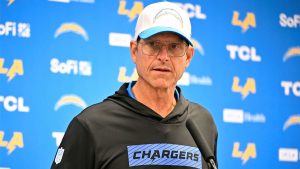
Just in:Warner says withdrawing from Olympic decathlon was a ‘worst nightmare…

Warner’s withdrawal from the Olympic decathlon has been described as his “worst nightmare,” reflecting the deep sense of disappointment and frustration that comes with such a significant setback.
As a highly competitive athlete, Warner had prepared extensively for this event, which represents the pinnacle of multi-discipline track and field competition.
The decathlon is a grueling test of strength, skill, and endurance, demanding peak performance across ten varied events.
Warner’s training regimen was intense, involving months of meticulous preparation, strategizing, and refining techniques in each of the decathlon’s components—from sprints and hurdles to jumps and throws.
His dedication underscores the importance of the Olympic Games as a platform for athletes to showcase their abilities and achieve their dreams.
The decathlon, being a test of an athlete’s overall versatility, adds a layer of emotional and psychological investment to the physical demands.
Withdrawing from such a prestigious event can be particularly devastating. For Warner, this experience likely represented not just a physical setback but also a deep emotional blow.
The decathlon’s rigorous demands mean that athletes often invest their entire focus and career aspirations into it.
Therefore, the inability to compete can feel like a significant personal and professional loss.
The psychological impact of withdrawal is compounded by the intense media scrutiny and public expectations that accompany Olympic events.
Athletes are often under tremendous pressure, both from themselves and their supporters, which can exacerbate feelings of failure and disappointment when things do not go as planned.
For Warner, the sense of having let down not just himself but also his coaches, family, and fans may be particularly painful.
Furthermore, the withdrawal from the Olympics also disrupts career trajectories and long-term goals.
For an athlete like Warner, who likely had a detailed plan for his career and was aiming for Olympic success as a cornerstone, the absence from the decathlon could impact future opportunities, sponsorships, and his overall career path.
In his reflections, Warner may have addressed these aspects, highlighting how the situation unfolded as a nightmarish scenario.
It is not just about missing an event but also grappling with the aftermath, including reassessing his goals, dealing with public perception, and navigating the emotional and practical challenges that arise from such a withdrawal.
In summary, Warner’s experience of withdrawing from the Olympic decathlon encapsulates a profound personal and professional crisis.
It represents a convergence of physical, emotional, and psychological challenges, illustrating the high stakes and intense pressures faced by elite athletes at the peak of their careers.







